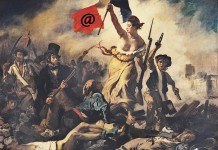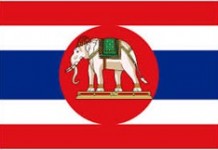
Editor’s Note: We are pleased to present a series of articles by Marie Lebert. Marie writes from Paris and these articles are an adaptation of articles that have appeared in Actua Litté. The link to the original article, in French, appears at the end of each piece. PB
The first ebook was available in July 1971, as eText #1 of Project Gutenberg, a visionary project launched by Michael Hart to create free electronic versions of literary works and disseminate them worldwide. In the 16th century, Gutenberg allowed anyone to have print books for a small cost. In the 21st century, Project Gutenberg would allow anyone to have a digital library at no cost.
The beginning of the project
As recalled by Michael Hart in January 2009 in an email interview: “On July 4, 1971, while still a freshman at the University of Illinois (UI), I decided to spend the night at the Xerox Sigma V mainframe at the UI Materials Research Lab, rather than walk miles home in the summer heat, only to come back hours later to start another day of school. I stopped on the way to do a little grocery shopping to get through the night, and day, and along with the groceries they put in the faux parchment copy of ‘The U.S. Declaration of Independence’ that became quite literally the cornerstone of Project Gutenberg. That night, as it turned out, I received my first computer account — I had been hitchhiking on my brother’s best friend’s name, who ran the computer on the night shift. When I got a first look at the huge amount of computer money I was given, I decided I had to do something extremely worthwhile to do justice to what I had been given. (…) As I emptied out groceries, the faux parchment ‘Declaration of Independence’ fell out, and the light literally went on over my head like in the cartoons and comics… I knew what the future of computing, and the internet, was going to be… ‘The Information Age.’ The rest, as they say, is history.” (NEF Interview)
Michael typed in the “U.S. Declaration of Independence” in upper case, because there was no lower case yet. He mentioned where the 5 K file was stored to the 100 users of the embryonic internet of the time, though without a hypertext link, because the web was still 20 years ahead. It was downloaded by six users.
Michael decided to search the books from public domain available in libraries, digitize these books and store their electronic versions. Project Gutenberg’s mission would be the following: to put at everyone’s disposal, in electronic versions, as many literary works from public domain as possible for free.
First considered as totally unrealistic, the project got its first boost with the invention of the web in 1990, which made it easier to distribute ebooks and recruit volunteers.
Years later, in August 1998, Michael wrote in an email interview: “We consider etext to be a new medium, with no real relationship to paper, other than presenting the same material, but I don’t see how paper can possibly compete once people each find their own comfortable way to etexts, especially in schools.” (NEF Interview)
A book became a continuous text file instead of a set of pages, using the low set of ASCII, called Plain Vanilla ASCII, with caps for the terms in italic, bold or underlined of the print version, for it to be read on any hardware and software. As a text file, a book would be easily copied, indexed, searched, analyzed and compared with other books.
Distributed Proofreaders
The project got its second boost with the creation of Distributed Proofreaders in 2000, to share the proofreading of ebooks between thousands of volunteers.
Distributed Proofreaders was launched in October 2000 by Charles Franks to support the digitization of public domain books and assist Project Gutenberg in its efforts to offer free electronic versions of literary works. The books are scanned from a print version and converted into a text version by using OCR, 99% reliable at the best, which leaves a few errors per page. Volunteers choose one of the books available on the site and proofread a given page. It is recommended they do a page per day if possible.
Distributed Proofreaders became the main source of Project Gutenberg’s ebooks, and an official Project Gutenberg site in 2002. Distributed Proofreaders became a separate legal entity in May 2006 and continues to maintain a strong relationship with Project Gutenberg. 10,000 books were digitized, proofread, and “preserved for the world” in December 2006, and 20,000 ebooks in April 2011, as “unique titles [sent] to the bookshelves of Project Gutenberg, free to enjoy for everybody. (…) Distributed Proofreaders is a truly international community. People from over the world contribute.” Distributed Proofreaders Europe (DP Europe) began production in early 2004. Distributed Proofreaders Canada (DP Canada) began production in December 2007.
“Less is more”
Project Gutenberg keeps its administrative and financial structure to the bare minimum. Its motto fits into three words: “Less is more.” The minimal rules give much space to volunteers and to new ideas. The goal is to ensure its independence from loans and other funding and from ephemeral cultural priorities, to avoid pressure from politicians and others. The aim is also to ensure respect for the volunteers, who can be confident their work will be used not just for a few years but for generations. Volunteers can network through mailing lists, weekly or monthly newsletters, discussion lists, forums, wikis and blogs.
In 2010, Project Gutenberg offered more than 33,000 ebooks (as stated on its home page) being downloaded by the tens of thousands every day, with websites in the United States, in Australia, in Europe, and in Canada, and 38 mirror websites worldwide.
40 years after the beginning of Project Gutenberg, Michael Hart describes himself as a workaholic who has devoted his entire life to his project. He considers himself a pragmatic and farsighted altruist. For years he was regarded as a nut but now he is respected.
Michael has often stated in his writings that, after Gutenberg allowing anyone to have its own print books for a small cost, Project Gutenberg would allow anyone to have a library at no cost stored in a pocket device. The collection of Project Gutenberg has the size of a local public library, but this time available on the web to be downloaded for free. The project’s goal is to change the world through freely-available ebooks that can be used and copied endlessly, and reading and culture for everyone at minimal cost.
French version:
http://www.actualitte.com/dossiers/1448-anniversaire-ebook-projet-gutenberg-visionnaire.htm
Next article: 1974 > The internet “took off”
This collection of 45 articles will include both well known and little known projects from 1971 to 2011, with an international perspective. If, despite all my efforts, you see some errors, please suggest corrections in an email to TeleRead’s editor for me.
Copyright © 2011 Marie Lebert



































The cheery little article ignores problems at Project Gutenberg and Distributed Proofreaders: problems of leadership and organization. As a dedicated DPer, I see DP as moving faster towards fixing them. DP now has an elected board of directors. PG is still an autocracy.